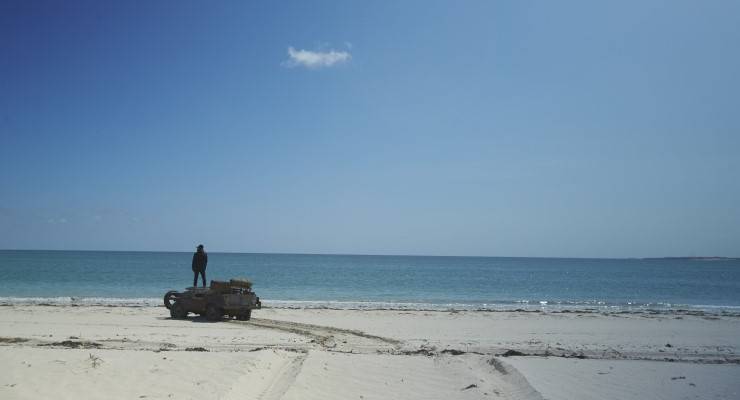
There is a scene towards the end of The Beach which stayed with me, as so many scenes did.
We are high above the shoreline. Indigenous filmmaker Warwick Thornton is in his vehicle, a souped-up bull-catcher that wouldn’t be out of place in Mad Max.
He drives in a perfect spiral, turning and turning in a widening gyre. Like so much in this solo TV series the effect is mesmerising.
But just as in The Second Coming, things fall apart; the centre cannot hold. Thornton imperceptibly at first but then drastically, veers in, skidding through his perfect contours before coming to rest in the centre. There he stands atop the vehicle, contemplating his sabotage into the distance.
Welcome to The Beach, a six-part, three-hour solo television project destined to be remembered as one of the year’s best.
A preview clip caused a sensation late last year at SBS’s programming showcase, with the audience of media, stakeholders and advertising professionals trying to work out what they were seeing. Still no one can agree.
“It’s me and two chickens having a slight nervous breakdown and cooking great food in the middle of nowhere,” Thornton told Crikey.
The program is a contemplative tone poem for our self-isolationist times. At the urging of friends and family — and himself — Thornton arrives to stay at the world’s coolest man-shack perched at the end of a remote beach near Jilirr, on Western Australia’s Dampier Peninsula.
“Every emotional battery was pretty much burnt out,” he says.
For the weeks of the shoot last year, Thornton gave everything away.
“All the fun drugs in the world, get rid of them all, and just get strong,” he said.
He never had an addiction to “electronic social happiness” and abandoning home and electronic comforts was immediately empowering.
His program has no narration to guide the way. When Thornton does talk he offers up painful episodes from his life, delivered to his companions, a couple of chickens and a dog. There are attempts at guitar playing and yoga. Most of all there is exquisite cooking.
TV is reductionist, so we cannot describe the program in terms other than what has come before. So The Beach is Bear Grylls meets Jamie Oliver meets Brené Brown.
It’s an aria, soliloquy, confessional, a one-man show, a boy’s own adventure. It is also the standout TV program of 2020.
Long after watching my thoughts returned to it time and again. The deceptively simple piano score from Megan Washington. The wind blowing across the sand. The widening spiral on the beach. Thornton cooking in an old brazier and pouring his heart out to the chickens, who cluck in a vaguely encouraging manner but couldn’t care less.
The program speaks to the silent downfall of many men and their determination to pull themselves back.
Tall, hairy, often dressed in black, Thornton, 49, is a reticent man. It leads to the question: who would want to undertake a project so exposing?
“Stupid people do,” he replies. “I’m a bloke, a village idiot, a larrikin. It came from that inner male in that kind of way.”
Thornton’s first feature film, Samson and Delilah, about young Indigenous love, demanded immediate attention, wining the Caméra d’Or at the Cannes Film Festival in 2009. In 2017 his western, Sweet Country, won awards at Toronto and Venice.
This program was really commissioned on his reputation, since he couldn’t describe properly — even during filming — if it would work.
The Beach is labelled “slow TV”, but this is no camera stuck on the front of a train for six hours.
Thornton dislikes the phrase.
“Fast TV is where you don’t have time to think,” he says. “This makes you think. All those fast thoughts are happening inside your head as an audience.
“Even though the shots might be a little bit longer, a little bit languid, and I don’t explain anything, you are actually thinking faster than really fast TV where you don’t have time to think.”
At the heart of the film is a scene where Thornton talks about managing his “little black puppy” and how he has learnt he must leave his depression scratching at the door and never invite it in — until it dies and he can once again face the world.
And it wasn’t until the end of the edit that Thornton realised it was mission accomplished, as a filmmaker and as a man.
“I came away from that shoot with my mind in an incredibly beautiful place,” he says. “I walked taller, I was much, much healthier, clear-eyed, with clear thoughts.
“Everything about the whole process of the shoot was exactly what it needed to be in my life.”
Last year Thornton made nine hours of television, including three episodes of the ABC outback thriller Mystery Road and hopes to see out the year by completing one or two features, dependent on the coronavirus.
“After that I will keep making movies, telling stories,” he says.
But whatever comes next, he will always be remembered for The Beach. An insight into the private world of a very private man. Three hours of meditative television, where so little happens, but so much.
The Beach airs on NITV and SBS on Friday May 29 at 7.30pm, and then on SBSOnDemand.









Looking forward to it, having had Mystery Road just finished. I found Samson and Delilah too dark, yet to see Sweet Country.